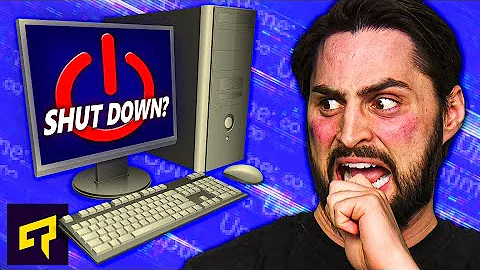Unplugging USB hard drive can damage computer? Seriously?
Solution 1
Shorter answer.
That claim of damage is more of a legal way for a manufacturer to protect themselves in the off-hand chance something goes wrong. Meaning it is practically nonsense. It’s no different than the obtuse language used in an EULA (End-User License Agreement) in the world of software; the manufacturer is right, you are wrong, our company has better lawyers than you, give us your money for a product, have a nice day, goodbye.
I highly doubt anything would be seriously damaged by removing a USB hard drive that is still active. So I wouldn’t live my life in fear of a warning like this.
I would however take this nonsense to mean if something did go wrong the manufacturer would avoid any responsibility or liability instead claiming the fault is yours since you failed to properly use the device as instructed in that little pamphlet most people immediately throw out when they purchase such a device.
More details below.
Longer answer.
Seriously? I’m going to fry my computer by doing something USB was explicitly designed for right from the beginning—hot-plugging? Surely a computer doesn’t become damaged just because a data transfer fails.
Will you fry your whole computer? Most likely no. Do you increase the risk—even on a slight level—of damaging a USB port by unplugging the drive while it’s active? I’d say yes. The risk mainly comes from something like static electricity being generated between you, the computer, the USB cable and the drive port. And since the drive is powered and connected to some level of grounding, it becomes an attractive path for a stray static charge as explained in this blog post on the “Premium USB Blog”; bold emphasis is mine:
ESD damage to your USB drives or ports can cause latency failures that will slow down your data transmission following static shock. Your port or device could also face more severe damage that would essentially fry it and cause it not to work at all. It could also shorten its overall lifespan. ESD can occur under simple circumstances—plugging and unplugging or flipping a nearby switch.
Before you alarmingly back away from your computer, be comforted by the fact that the average computer user won’t necessarily have to worry about it happening. However, it’s still important to know about it in case you ever find yourself in a situation where ESD may occur. The odds of static shock increase once you add computer system upgrades, USB hard drives, graphics cards and other heavy duty peripherals.
Because USB ports are hot pluggable, they need protection against static shock. With USB 2.0 data transfer rates up to 480Mbps and USB 3.0 at 5Gbps, these speeds are fast enough to spark interruptions in the signals. Many USB hubs are protected from ESD up to 2kV, but that’s not always enough.
But again the risk is slight but—as that article explains—the risk does exist on some level.
Another risk is gyroscopic inertia that stems from the hard drive itself still spinning while you disconnect it. I’ve actually lost two external 3.5" drives because I unmounted them, disconnected them and grabbed them too quickly while the drives themselves were still spinning. The disorientation from me lifting one way but the gyroscopic inertia from spinning platters pulling in another direction resulted in me losing my grip on the enclosure with the drive coming crashing down onto the floor and basically making the drive unusable. But again, this is an edge risk.
If you ask me, overwrought details like this in the manuals are not warning you of a common risk as much as they are limiting the drive manufacturer’s liability if somehow your data is lost—or the drive dies—and you end up complaining to the manufacturer. The idea is you would conceivably call up a support tech, they would ask you what you did, you might tell them you disconnected the drive in the middle of a transfer and then they might say, “Sorry, but we don’t cover that.”
Remember, much like an EULA (End-User License Agreement) the main purpose of such documentation is not to make sure you read it as much as it is in the manufacturer’s best interest to make sure they can claim you were provided these “warnings” if something goes wrong from a legal standpoint.
Also, just a clarification on this point:
I’m going to fry my computer by doing something USB was explicitly designed for right from the beginning—hot-plugging?
The idea that USB devices can be hot plugged into the system simply means the USB connection is “hot pluggable” but how the devices past that basic connection reacts if hot plugged is a different issue entirely.
For example, I just updated my iPhone while writing this post and I had it connected to my Mac Mini via a USB cable. Sure, I could have unplugged the USB cable in them middle of the update… And what would happen? My computer would be fine and my iPhone would technically be fine from a physical standpoint. But if I unplugged it at the perfectly wrong moment, I could have “bricked” my iPhone.
A device being “hot pluggable” simply means that the device can be connected without having to completely power down the main system to connect it or use a device “probe” like those SCSI probe control panels most every Mac OS install had back in the pre-Mac OS X days of the OS.
Solution 2
I believe the technical term is "covering your rear".
Its unlikely you will damage your pc, and somewhat unlikely you'll kill your hard drive (though sudden power stops are bad).
However, you might cause data loss, if a transfer is in progress.
That said, if the drive does die, this gives them grounds to deny a warranty request if you mention doing that, and pretty much covers them if there's data loss. "It says so in the manual, you were using it wrong"
Ejecting properly is best practice but hardly a matter of life and death.
Solution 3
They might be afraid that you could copy system files from your USB drive onto your main hard drive (from a backup, say): detaching your USB drive in the middle of a transfer could leave you with an incomplete copy of a system file on your hard drive that would then no longer work, thus "damaging" your computer. Think about an incomplete explorer.exe on Windows or bash on Linux, and the effect they would have on system startup.
Solution 4
If you are talking about an actual hard drive with a spinning motor (eg. an inductive load), you shouldn't discount the possibility of an inductive voltage spike when disconnecting power:
https://electronics.stackexchange.com/a/19868
Obviously both the drive AND the computer should be designed to withstand it, but it is definitely possible that the hard drive motor, powered via USB, could generate enough of an inductive "kick-back" when disconnected to damage the drive AND/OR the computer.
So naturally, as other users mentioned, they're covering their liability.
Edit:
Here is what an inductive voltage spike looks like on a much larger scale:
Solution 5
"while file transfer is in progress" which means that the file structure would be in flux and could get corrupted if it doesn't have some kind of transaction system. Using "Safely Remove Hardware" will flush any delayed writes, wait until the transfer is complete and ensure no programs are using files on it.
I have personally seen a usb drive fail to mount on unix after being pulled out of a Windows machine without "Safely Removing" it. Putting it back into the widows machine and doing a safe remove fixed it.
Related videos on Youtube
misha256
Updated on September 18, 2022Comments
-
misha256 almost 2 years
I’m reading through the manual for a Samsung portable USB hard drive, and I’ve come across this warning:
Detaching the USB cable while file transfer is in progress can damage your computer and/or [hard drive].
Here’s the original warning:
Seriously? I’m going to fry my computer by doing something USB was explicitly designed for right from the beginning—hot-plugging? Surely a computer doesn’t become damaged just because a data transfer fails.
-
qasdfdsaq over 8 yearsSamsung seems to have a habit of this lately... "Inserting pen into phone the wrong way round can destroy both your pen and phone. It's not a design fault cause we told you not to do it in the manual"
-
Thalys over 8 yearsOh, THAT is a good warning to have. I'm suprised that didn't get caught in testing, and they didn't key the pen but...
-
qasdfdsaq over 8 yearsThe fact the warning was in the manual suggests they were fully aware of it in testing, but decided to tell customers "You're doing it wrong" instead of fixing it to work how most customers would assume.
-
Thalys over 8 yearsCause no one reads the warranty terms? Though I suppose no one reads the manuals either...
-
Ramhound over 8 years@JourneymanGeek - Most people don't read at all I have found :-)
-
 user over 8 yearsThat isn't damage to the computer.
user over 8 yearsThat isn't damage to the computer. -
 Admin over 8 yearsNot sure why people use an actual USB Hard Drive. Why not simply use a memory thing? 32 GB ought to be enough for anyone.
Admin over 8 yearsNot sure why people use an actual USB Hard Drive. Why not simply use a memory thing? 32 GB ought to be enough for anyone. -
8bittree over 8 years@nocomprende Exactly. 32 GB is plenty of space to backup my 3 TB photo library on.
-
 Nzall over 8 yearsI have seen USB drives get corrupted when unplugged while writing on a Windows XP machine back in high school. one of my classmates lost half a year of progress in his digital accounting class because of it.
Nzall over 8 yearsI have seen USB drives get corrupted when unplugged while writing on a Windows XP machine back in high school. one of my classmates lost half a year of progress in his digital accounting class because of it. -
8bittree over 8 years@nocomprende Probably never, now that I've shipped off the drive to my customer. I'm sure they'll be satisfied. Meanwhile, it's time for me to edit my video. Though perhaps I should make a backup of the 12 TB (It's going to be a lengthy piece and I'm hoping to make an 8k release eventually), just in case I accidentally make a destructive edit.
-
 Admin over 8 years@8bittree I often wondered how people ship large amounts of data. Never heard of an actual spinning USB DRIVE before. Sounded pretty silly. Not sure how to make long-term usable archives of anything I actually do want to have available in the future. Laptop will not burn a CD... What else is there? How does stuff get archived now?
Admin over 8 years@8bittree I often wondered how people ship large amounts of data. Never heard of an actual spinning USB DRIVE before. Sounded pretty silly. Not sure how to make long-term usable archives of anything I actually do want to have available in the future. Laptop will not burn a CD... What else is there? How does stuff get archived now? -
8bittree over 8 years@nocomprende Sneakernet is king when it comes to moving around massive amounts of data. And HDDs are just a bit more convenient to handle than microSD cards, not to mention cheaper. For archiving, tape is still somewhat popular in the enterprise. For home users, HDDs, SSD, or an external ODD could work.
-
 ave over 8 yearsCan confirm, same happened to me about the windows safe remove and Linux back in 2008.
ave over 8 yearsCan confirm, same happened to me about the windows safe remove and Linux back in 2008. -
Carey Gregory over 8 years@nocomprende I've had USB drives for years. Where you been? And since USB 3.0 is comparable to SATA in speed, I use them even more now than I did when they were limited to USB 2.0. Long term archival for most users is going to be on external USB drives. In enterprise environments with many terabytes of data to archive, tape still rules.
-
 Admin over 8 years@CareyGregory When I say Archive, I mean, put it in a drawer in case you want to retrieve it years from now. Sticking an entire hard drive in a drawer seems like a cumbersome and expensive way to make backups that you want to keep around for a while. I have heard that even CDs can become unreadable after a few years. What do most people use?
Admin over 8 years@CareyGregory When I say Archive, I mean, put it in a drawer in case you want to retrieve it years from now. Sticking an entire hard drive in a drawer seems like a cumbersome and expensive way to make backups that you want to keep around for a while. I have heard that even CDs can become unreadable after a few years. What do most people use? -
 Mark over 8 yearsThe real problem is when they mix the serious warnings in with the ass-covering. For example, buried in eight pages of "don't use your microwave in the bathtub"-type warnings I found a couple of lines about actual, non-obvious, "people are likely to actually do this" fire hazards.
Mark over 8 yearsThe real problem is when they mix the serious warnings in with the ass-covering. For example, buried in eight pages of "don't use your microwave in the bathtub"-type warnings I found a couple of lines about actual, non-obvious, "people are likely to actually do this" fire hazards. -
 Ben Voigt over 8 years@Ramhound: The answer is pretty clear about the direction of the copy (and already was in the first revision).
Ben Voigt over 8 years@Ramhound: The answer is pretty clear about the direction of the copy (and already was in the first revision). -
Charles E. Grant over 8 years@nocomprende, actually if you price high capacity digital tape vs. commodity SATA drives, the price is quite reasonable, and restoring files is much more convenient: no waiting for the tape to seek to the appropriate spot. For a personal system, where you aren't generating TB of new data each month, backing up to removable hard drives is almost certainly the way to go. I rotate between two 3 TB data disks each week, with once alway stored off-site.
-
 Admin over 8 years@CharlesE.Grant so how do you keep things for years, in case something gets accidentally deleted and you do not know when it happened? Also, for business recordkeeping (small business) such as annual accounting backups? Lots of hard drives lying around? What is the format for such anticipated long-term archiving needs? What should I be using that will be around in 10 years? (Don't say Cloud)
Admin over 8 years@CharlesE.Grant so how do you keep things for years, in case something gets accidentally deleted and you do not know when it happened? Also, for business recordkeeping (small business) such as annual accounting backups? Lots of hard drives lying around? What is the format for such anticipated long-term archiving needs? What should I be using that will be around in 10 years? (Don't say Cloud) -
TOOGAM over 8 yearsCloud, paper, tape, hard drives... up to you. There are lots of different opinions. I've used hard drives, and found they've tended to go bad over time, so it's best to not just store things in a drawer forever, but to make a copy onto newer equipment. A full old drive is likely to take up just a fraction of the space of newer equipment.
-
Charles E. Grant over 8 years@nocomprende, this should probably migrate to it's own question. My observation from doing backups over 30 years is that no media is guaranteed to be useable after 10 years in a drawer. Currently I use TimeMachine with a pair of duplicate hard drives, and transfer to a newer, larger, cheaper hard drive every three years.
-
Carey Gregory over 8 yearsAn excellent summary of the lifespan of hard drives can be found here.
-
 Ben Voigt over 8 years@Ramhound: On Linux, you certainly can.
Ben Voigt over 8 years@Ramhound: On Linux, you certainly can. -
 Lightness Races in Orbit over 8 years@NateKerkhofs: What, he only had one copy of half a year's classwork?
Lightness Races in Orbit over 8 years@NateKerkhofs: What, he only had one copy of half a year's classwork? -
 Nzall over 8 years@LightnessRacesinOrbit It wasn't that big a deal, honestly. Our digacc class was entirely based on just showing up and doing the book assignments. In fact, I think it wasn't even graded, except as part of the regular accounting class. We didn't get homework, and I think maybe 1 or 2 tests. The class was just so that any of us who was interested in a career as accountant could do so having used at least some professional software in high school. All other accounting classes involved doing everything on paper.
Nzall over 8 years@LightnessRacesinOrbit It wasn't that big a deal, honestly. Our digacc class was entirely based on just showing up and doing the book assignments. In fact, I think it wasn't even graded, except as part of the regular accounting class. We didn't get homework, and I think maybe 1 or 2 tests. The class was just so that any of us who was interested in a career as accountant could do so having used at least some professional software in high school. All other accounting classes involved doing everything on paper. -
 Lightness Races in Orbit over 8 years@NateKerkhofs: Okay your original comment made it sound like a catastrophe :P
Lightness Races in Orbit over 8 years@NateKerkhofs: Okay your original comment made it sound like a catastrophe :P -
Samuel over 8 yearsThis is the correct answer, but it's lost on most of the software people here.
-
 Marty Fried over 8 years@MichaelKjörling: what is your definition of the computer? I think a hard drive is a part of the computer, and if your system drive gets damaged, for many people that would be pretty serious. For Samsung to go into great detail about how it might cause damage would simply confuse the average user, and would be a waste of time.
Marty Fried over 8 years@MichaelKjörling: what is your definition of the computer? I think a hard drive is a part of the computer, and if your system drive gets damaged, for many people that would be pretty serious. For Samsung to go into great detail about how it might cause damage would simply confuse the average user, and would be a waste of time. -
 user over 8 years@MartyFried What Gaurav is talking about counts, in my book, as logical file system damage. "Damage to the computer" means, to me, that one or more physical devices no longer function nominally after the event. There's a big difference between wrong data being stored (even if that happens to be in the file system metadata) and for example the disk's on-board controller being damaged.
user over 8 years@MartyFried What Gaurav is talking about counts, in my book, as logical file system damage. "Damage to the computer" means, to me, that one or more physical devices no longer function nominally after the event. There's a big difference between wrong data being stored (even if that happens to be in the file system metadata) and for example the disk's on-board controller being damaged. -
 Marty Fried over 8 years@MichaelKjörling - you missed my point; for the average user, if the computer does not work, it is damaged. Doesn't matter what you call the damage, it just doesn't work.
Marty Fried over 8 years@MichaelKjörling - you missed my point; for the average user, if the computer does not work, it is damaged. Doesn't matter what you call the damage, it just doesn't work. -
xji over 8 years@Mark Unfortunately such nonsense happened in the first place because of ridiculous lawsuits filed and won.
-
EDM over 4 years@Mark so true. And all these ass-covering and 'do not do anything stupid' warnings make people more likely to not read the warnings at all, thus missing the actual fire hazards and risks!







